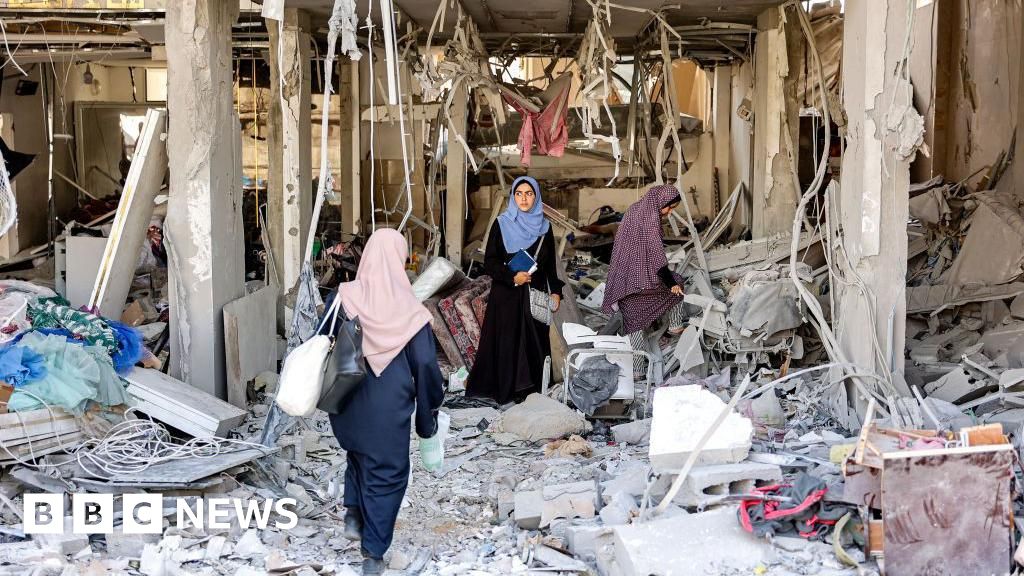Image source, Getty Images
- Author, Lucy Williamson
- Role, Middle East correspondent, Jerusalem
When is a ceasefire not a ceasefire? According to the Israeli army, when it’s a “local, tactical pause of military activity for humanitarian purposes”.
Israel’s humanitarian aid coordinator for Gaza set out the details of the scheduled daily pause in fighting between 08:00 and 19:00 local time, along a key route running north from the Kerem Shalom crossing point, where aid is waiting to be delivered.
The announcement almost immediately triggered a furious political assault from far-right government ministers – and a rapid defence from Israel’s army, insisting that it did not signal an end to the fighting in southern Gaza, or any change to the entry of humanitarian aid.
The fact that this announcement has proved so explosive highlights the increasingly fraught situation of Israel’s prime minister, caught between the costs of his vague and so far unattainable military goals of dismantling Hamas and bringing home the hostages, and the political allies he relies on to stay in power.
Agencies will still need to coordinate their movements with the Israeli army, and the Gaza director for the World Food Programme, Matt Hollingworth, said the test would be whether that coordination became smoother and faster as a result.
But he also said that coordination was only part of the obstacle agencies faced in delivering aid inside Gaza.
Sunday’s announcement “doesn’t resolve the issue of insecurity and criminality,” he said. “And this is the most dangerous area of the Gaza Strip right now for moving aid.”
Aid agencies reported over the weekend that the continuing war was fuelling acute malnutrition in parts of Gaza.
Israel is under pressure – from NGOs, allies and its own High Court – to get more aid into Gaza.
But Prime Minister Benjamin Netanyahu faces stiff opposition from two far-right cabinet colleagues, who say they will bring down his government if he agrees to end the war, and who see aid deliveries as delaying Israel’s victory.
They reacted furiously to today’s announcement, with Internal Security Minister, Itamar Ben-Gvir, describing “whoever made this decision” as “evil” and “a fool”.
Finance Minister, Bezalel Smotrich, said that humanitarian aid helped keep Hamas in power and risked putting “the achievements of the war down the drain”.
That the army could issue this message on a day when Israel was burying eleven of its soldiers, he said, was a symptom of the leadership giving too much weight to international opinion and not enough to the forces on the ground.
Both men have threatened to bring down Mr Netanyahu’s coalition government if he ends the war, as America wants.
But pressure over the costs of that war are rising at home too. Israel’s parallel conflict with Hezbollah in Lebanon has escalated in recent days, highlighting the broader risks of continuing the war with their Hamas allies.
Last night, large crowds turned out to protest in Tel Aviv, calling on Mr Netanyahu to end the conflict in Gaza and sign a deal to return 120 Israeli hostages home.
And the funerals of eleven soldiers, killed in Gaza over the weekend, are again pulling into focus questions over how the stated war aims of Israel’s prime minister can be achieved.
Mr Netanyahu has promised “total victory” against Hamas. He has framed the current operation in Rafah as an assault on the group’s last remaining battalions in Gaza – necessary to destroy it, he says.
But it’s clear that even dismantling Hamas as a structured military organisation does not mean an end to the conflict entirely. Israeli forces still face guerrilla operations by Hamas fighters in areas they have previously cleared.
And there’s no sign that the group’s key leaders – Yahya Sinwar and Mohammed Deif – have been killed or captured.
For Mr Netanyahu, ending the war is likely to bring a fresh battle for his own political survival.
The divisions laid bare today between his army and his allies highlight the tensions between rhetoric and reality in this war.
And the tensions Mr Netanyahu faces in straddling them: caught between the promise of “total victory” and the prospect of a “forever war”.
#Military #pause #Gaza #road #inflames #divisions #Israeli #government,
#Military #pause #Gaza #road #inflames #divisions #Israeli #government
